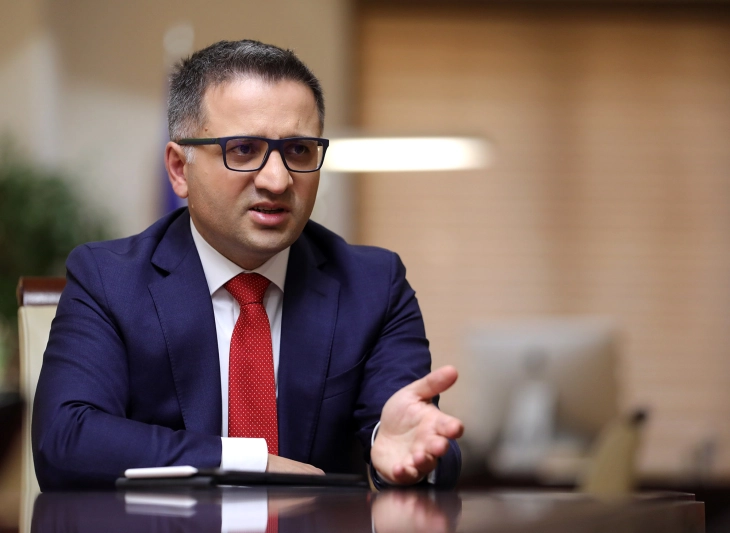FinMin Besimi: It’s important Parliament to adopt budget on time

Skopje, 13 November 2021 (MIA) – Parliament discussions on the 2022 draft-budget should start as of Monday. It is important the budget to be adopted within the deadline regulated by the law because it ensures uninterrupted financing of the state institutions, strong financial support for economic recovery and accelerated, inclusive and sustainable economic development, Finance Minister Fatmir Besimi has said.
“It’s important to note that the budget secures also timely payment of salaries, pensions, social benefits, subsidies as it also secures the implementation of capital investments, which are planned at 37.8 billion denars in 2022, higher than the budget deficit. It abides by the golden rule in public finances, namely more funds are planned to finance investment projects that the envisaged borrowing,” Minister Besimi tells MIA.
The draft-budget, he says, is developing as proven by the record high amount of capital investments in total expenditures of 14 percent.
“Budget deficit is projected at 33.5 billion denars, i.e. 4.3 percent of the planned GDP, whereas capital expenditures are projected at 37.8 billion denars – 4.9 percent of the GDP,” Besimi states.
It means, he adds, that money will be borrowed in 2022 only for investment projects.
The “value for money” principle will dominate, meaning taxpayers’ money will be directed where it is most likely to achieve improved living qualities.
According to projections, total expenditures in the draft-budget are 272.4 billion denars (32% of GDP). Revenues are projected at 238.9 billion denars (30.9% of GDP). Total revenues are up 7.4% compared to 2021 and expenditures are up 1.4% compared to this year, however as a percentage of the GDP they are lower compared to 2021. Deficit is projected at 33.5 billion denars (4.3% of GDP) and inflation rate is 2.4%.
Regarding capital investments, Minister Besimi tells MIA they should be directed in key infrastructural areas that generate growth.
Amid crisis and the year when the country should pay the EUR 500-million Eurobond, issued in 2014, public debt decreased to 59.3% up until the third quarter, he notes.
“This is a proof of the well-designed fiscal policy and good management with public finances in the midst of the pandemic. The Finance Ministry is strongly committed to stabilizing debt at a level of 60% of the GDP,” Besimi tells MIA.







